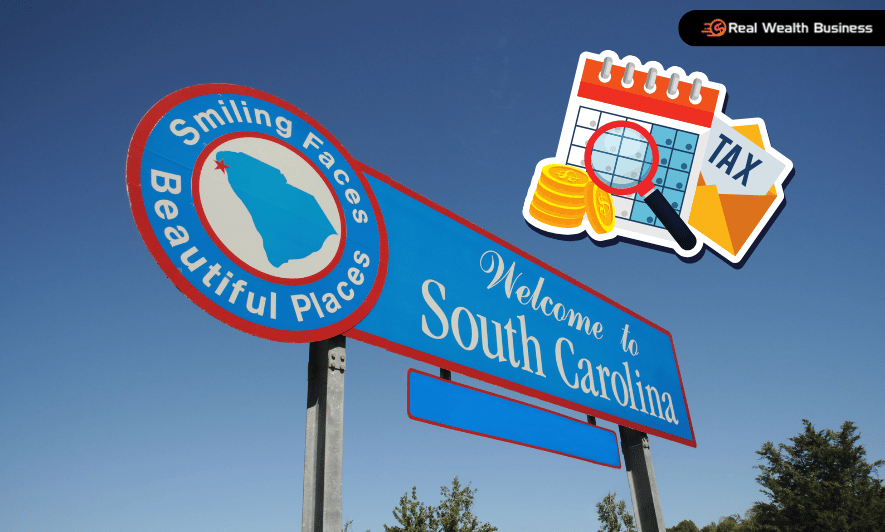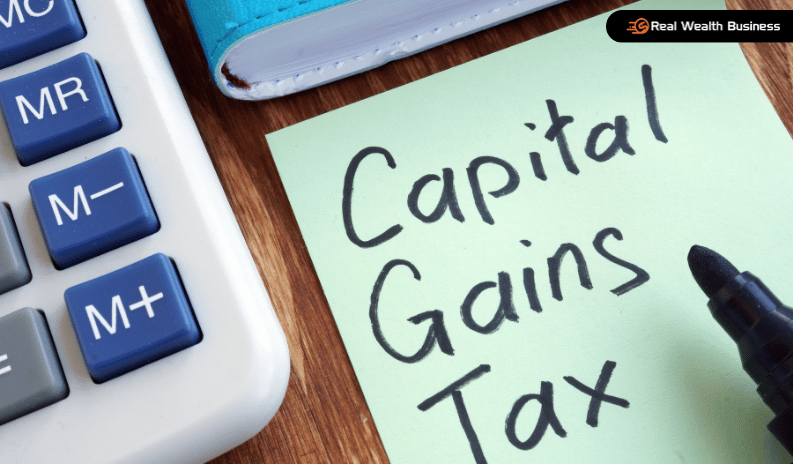How Capital Gains Tax in South Carolina Can Help Your Business?
by Abdul Aziz Mondal Finance Published on: 29 July 2024 Last Updated on: 11 November 2024

Being a high networth individual is a challenging task. It would help if you had a clear understanding of several aspects. But if you want to learn more about South Carolina capital gains tax, this article is the right place for you to be. We have gone the mile to bring you all the points you need to remember to understand the subject at hand better.
What Is Capital Gains Tax?

Before we delve deeper into the rabbit hole to answer the question of the hour: “How much is capital gains tax in South Carolina?” We need to have a clear understanding of the basics. Otherwise, our South Carolina Capital Gains Tax knowledge would be futile and incomplete.
Capital gains tax is generally levied on the profits earned from the sale of an asset, unlike income tax. These assets could include real estate, stocks, collectables, bonds, etc. Therefore, the spectrum is broad and extensive.
According to the Internal Revenue Service (IRS), the base capital gains tax rate oscillates between 10% to 15%. However, this is a generalized figure, as you will see when studying more about the South Carolina Capital Gains Tax.
This tax rate is usually broken into two different forms. The following section will help you understand that.
Types Of Capital Gains Taxes

IRS segregates assets according to time. If an asset was held for less than three years, the overall tax rate will differ. Meanwhile, if an asset exceeds the said time, the tax rate would differ.
Here is a generalized overview of two different forms of Capital Gains taxes so that you have a better understanding of the South Carolina Capital Gains Tax in the long run.
Short Term Capital Assets (STCA)
STCA applies to assets that were held for less than 36 months (about 3 years). Therefore, assets that were merely held for three years or 36 months (about 3 years) can be called short-term capital assets. These assets levy lower tax rates.
IRS has set the base time to 36 months (about 3 years). However, in some cases, this period can even be reduced to 24 or 12 months. This discrepancy is most noticed when the assets are shares. As a result, many financial experts avoid Capital Gains Taxes on stocks.
Long Term Capital Assets (LTCA)
LTCA is quite like STCA. However, these assets are usually held for more than 36 months (about 3 years). Any asset that has been held for more than 36 months qualifies as an LTCA.
LTCA demands higher tax rates than STCA. However, like STCA, there can be variations in the rule regarding the time. In some cases, the holding period is reduced to 24 months (about 2 years). Therefore, you need to check your assets effectively to know the holding period.
Real estate assets are considered to be LTCA assets if they exceed the 24-month time period. Therefore, if you plan on buying or selling land in South Carolina, you need to update yourself about the holding period according to South Carolina Capital Gains Tax Laws.
Capital Gains Tax Strategy

Suppose you fall under a high-net-worth individual bracket, and you are paying hefty Capital Tax gains. In that case, you must consider employing specific strategies to optimize your Capital Gains Tax.
This optimization can be done in several different ways. However, the internet believes that there are only two methods that can produce accurate and optimized results.
Here are two ways you can legally break the South Carolina Capital Gains Tax system.
Strategic Selling
The foremost way to lower or optimize your tax returns is by holding your investments for more than a year before you decide to sell. This is a significant way of reducing your overall percentage. Long-term taxable assets tend to generate lower rates.
This would optimize your overall tax bills at the end of the year. As a result, many individuals use this method to optimize the South Carolina Gains Tax.
Income Composition
Another way that you can use to optimize your tax is to diversify your investment. If you want to scale your net worth but want to avoid paying hefty taxes, then you should diversify your income. Keep the wage side of the earnings low and shift the lion’s share to capital returns.
Capital returns come with lower tax brackets in the South Carolina Capital Gains Tax laws. This is another method tested to lower the overall tax bracket in South Carolina.
Understanding South Carolina Capital Gains Tax

What is the capital gains tax rate in South Carolina? Is It viable? Well, yes. Like every other state, you need to pay capital gains tax in South Carolina as well if you are looking to deal with properties. Therefore, understanding the whole deal is essential to understanding one of the most lucrative taxes in South Carolina.
The South Carolina Capital Gains Tax Long Term rate is 7% of your gain. However, the government can choose to exempt Capital Gains.
The government exempts Around 44% of this tax. This, in turn, brings the overall percentage down. Therefore, you are paying around 3.92% of your gains.
For example, if an individual has an overall gain of $100,000, they have only to pay around $3,920. This is the basic mathematics you must remember while dealing with this tax.
If you are still confused, you can look for an online tax calculator. This should help you understand Capital Gains Tax in South Carolina.
Can You Avoid It?
The answer to this question is a mix of yes as well as no. Section 121 of the South Carolina Capital Gains Tax law mandated that single fillers would face some leeways. As per the mandate, single fillers will be exempted from the first $250,000 gain.
However, any other real estate deal would fall under the 1031 Tax Deferred Exchange. This method allows realtors to defer the capital gains tax by rolling it with other taxable gains. Therefore, you might be unable to eliminate capital gains according to this tax, but you can delay it.
Therefore, you can roll your taxes, but never eliminate them. Otherwise, you are committing a federal crime.
State-Wise Capitals Gains Tax

We have already discussed most things about the South Carolina Capital Gains Tax. However, if you have multiple properties at multiple locations, then this guide will help you.
Here is a comprehensive list of Federal + State Capital Gains Tax Rate(s) and State Capital Gains Tax Rate(s) of the remaining 49 states of America. These figures are accurate at the time of writing.
| State | Federal + State Capital Gains Tax Rate | State Capital Gains Tax Rate |
| Alabama | 25.00% | 5.00% |
| Alaska | 20.00% | 0.00% |
| Arizona | 22.50% | 2.50% |
| Arkansas | 24.90% | 4.90% |
| California | 33.30% | 13.30% |
| Colorado | 24.55% | 4.55% |
| Connecticut | 26.99% | 6.99% |
| Delaware | 26.60% | 6.60% |
| District of Columbia | 30.75% | 10.75% |
| Florida | 20.00% | 0.00% |
| Georgia | 25.75% | 5.75% |
| Hawaii | 27.25% | 7.25% |
| Idaho | 25.80% | 5.80% |
| Illinois | 24.95% | 4.95% |
| Indiana | 23.15% | 3.15% |
| Iowa | 26.00% | 6.00% |
| Kansas | 25.70% | 5.70% |
| Kentucky | 24.50% | 4.50% |
| Louisiana | 24.25% | 4.25% |
| Maine | 27.15% | 7.15% |
| Maryland | 25.75% | 5.75% |
| Massachusetts | 29.00% | 9.00% |
| Michigan | 24.25% | 4.25% |
| Minnesota | 29.85% | 9.85% |
| Mississippi | 25.00% | 5.00% |
| Missouri | 24.95% | 4.95% |
| Montana | 26.90% | 6.90% |
| Nebraska | 26.64% | 6.64% |
| Nevada | 20.00% | 0.00% |
| New Hampshire | 20.00% | 0.00% |
| New Jersey | 30.75% | 10.75% |
| New Mexico | 25.90% | 5.90% |
| New York | 30.90% | 10.90% |
| North Carolina | 24.75% | 4.75% |
| North Dakota | 22.90% | 2.90% |
| Ohio | 23.99% | 3.99% |
| Oklahoma | 24.75% | 4.75% |
| Oregon | 29.90% | 9.90% |
| Pennsylvania | 23.07% | 3.07% |
| Rhode Island | 25.99% | 5.99% |
| South Dakota | 20.00% | 0.00% |
| Tennessee | 20.00% | 0.00% |
| Texas | 20.00% | 0.00% |
| Utah | 24.95% | 4.95% |
| Vermont | 28.75% | 8.75% |
| Virginia | 25.75% | 5.75% |
| Washington | 27.00% | 7.00% |
| West Virginia | 26.50% | 6.50% |
| Wisconsin | 27.65% | 7.65% |
| Wyoming | 20.00% | 0.00% |
The Closing Thought
In summation, that was all there is to know about South Carolina Capital Gains Tax. If you are someone starting in this field, then we hope we were of some help. Keep following our page for more such finance and business content. Thank you!
Additional Reading:



































































































